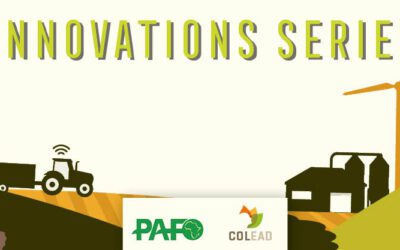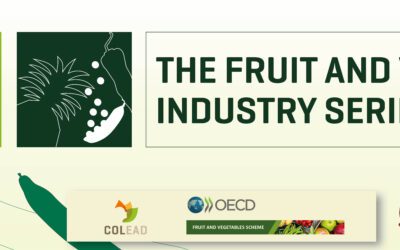Climate-Resilient Business Models for Women Entrepreneurs
Innovations Session N°6
September 30, 2021
The recording of the session is available in English and French on YouTube
Unlocking business opportunities in agroecology
Growing scientific evidence and local experiences demonstrate how agroecology facilitates and contributes to the transition to food and agricultural systems that are environmentally sustainable, economically viable, and socially equitable. Around the world, farms, communities and regions are engaging in agroecological transitions, and delivering results. Approximately 30% of farms around the world are estimated to have redesigned their production systems around agroecological principles.
There is an increasing amount of evidence showing the positive impacts of agroecology on the environment, on biodiversity, on farmers’ incomes, on resilience, and on adaptation and mitigation to climate change. Building on traditional knowledge and wider management skills passed down through generations also contributes to increased resilience. Knowledge co-creation and dissemination via advisory services and farmer-to-farmer approaches, are key to support development, improvement and uptake of agroecological practices as highlighted by field cases.
Entrepreneurship development is expanding in the production and/or commercialisation of agroecological products, which contribute to sustainable rural development through preservation of their lands, the improvement of their quality of life, and the adoption of a natural and healthy food culture.
Environmental awareness, among both entrepreneurs and the general population, has a favorable influence on agroecological entrepreneurship. However, while agroecological systems draw on natural synergies and use locally-available resources, transitioning to this model entails costs for entrepreneurs who need support.
Various initiatives in support of agroecology benefit entrepreneurs and farmers in Africa. Youth in Agroecology and Business Learning Track Africa (YALTA) is an initiative with the goal to support young agripreneurs to apply agroecological principles and to co-create networks to contribute to increased sustainability of food systems and youth employment in Ethiopia, Kenya, Uganda, and Rwanda.
While agroecology promotes low use of external inputs, it is a very knowledge-intensive system. Transmission of this knowledge, adaptation to local contexts, and appropriation by farmers and government technicians, are essential steps for farmers and communities to reap the benefits of agroecology. The case studies demonstrate how the expansion of agroecological practices will generate a rapid, fair and inclusive development, that can be sustained for future generations. The Oakland 33 case studies highlight successes of agroecological agriculture across the African continent in the face of climate change, hunger, and poverty.
An increasing number of countries and stakeholders from different backgrounds see agroecology and related approaches as a promising means for reaching adaptation and mitigation targets and to achieve an effective transformational change.
However, there are still barriers to the scaling-up of agroecology. Access to knowledge and understanding of systemic agriculture approaches should be fostered across sectors, stakeholders and scales. Further comparative research on the multidimensional impacts of agroecology should be done. Science and policy interfaces are necessary and the Koronivia Joint Work on Agriculture (KJWA) should be continued to ensure this interface, turning the submissions and recommendations into action. Donors, decision-makers and other stakeholders should embrace complexity, adopt a more systemic understanding of challenges and solutions to hedge against climate change, grasp environmental issues in a holistic way and move towards more policy coherence, by breaking silos. There is a need for developing agroecological curricula at colleges and universities as well as a network of decentralised centres of excellence on agroecology in sub-Saharan Africa.
Agroecological transitions will require significant shifts in the enabling policy environment, with the need for strategies, policies, programs and other actions that are conducive to such transitions. At policy level, there is a global political recognition at the highest level and various initiatives, all key to support the farmers and private sector operators to upscale agroecological practices. Recently, this year at the One Planet Summit held on 11 January 2021, a new coalition, the International Agroecological Movement for Africa (IAM Africa) was launched.
The Special Session of the 48th Plenary of the Committee on World Food Security (CFS) (CFS 48) took place virtually endorsed the CFS Policy Recommendations on Agroecological and Other Innovative Approaches. The endorsement of the Policy Recommendations was moved from CFS 47 (held in February 2021) as their negotiations and completion was delayed due to COVID-19. Policy Recommendations include: (i) Lay or strengthen, as appropriate, the policy foundations for agroecological and other innovative approaches to contribute to sustainable agriculture; (ii) Establish, improve and apply comprehensive performance measurement and monitoring frameworks to encourage the adoption of agroecological approaches; (iii) Foster the transition to resilient and diversified sustainable agriculture and food systems through agroecological and other innovative approaches; (iv) Strengthen research, innovation, training, and education and foster knowledge co-creation, knowledge sharing and co-learning, on agroecological and other innovative approaches; and (v) Strengthen institutions for stakeholder engagement, create an enabling environment for empowering people most at risk of food insecurity and malnutrition.
Key points for discussion on transitioning to agroecological practices
- How African MSMEs and farmers organisations can upscale more sustainable practices from farm to fork? What are the drivers of success?
- What obstacles do they face? What support do they need?
- What incentives can be provided to MSMEs and smallholders to transition and accelerate the adoption and implementation of agroecological practices?
Session Region
Networking
Join our Forum to discuss and explore how to encourage innovations across agricultural value chains to transform food systems in African, Caribbean and Pacific countries and beyond, promote sustainable agriculture & leverage investments. Share insights, ask questions, and collaborate on innovative solutions for a greener future.

Olayemi AGANGA
Co-founder, Maungo Craft, Bostwana
Olayemi Aganga is a Nigerian-born citizen of Botswana, having moved to Botswana at the age of six. He has a...

Fatma BEN REJEB
CEO, Pan-African Farmers Organization (PAFO)
Fatma has been working with farmers’ organisations for more than 20 years. She began her involvement in land and legal...

Isolina BOTO
Head of Networks and Alliances, COLEAD
Isolina is the Head of Networks and Alliances at COLEAD, a non-profit Association of private sector operators in the agrifood...

Gustav DESSOGOM BAKOUNDAH
Director, Label d’Or and Jus Délices, Togo
After his high school graduation and having studied banking and finance, Gustav started working with organic pineapple producers. He provided...

Emile FRISON
Member of the International Panel of Experts on Sustainable Food Systems (IPES), co-lead of UNFSS solution cluster Agroecology
Emile Frison is a member of the International Panel of Experts on Sustainable Food Systems (IPES). A Belgian national, he...

Jeremy KNOPS
General Delegate, COLEAD
Jeremy holds a Master’s degree in Business Engineering from the Solvay Brussels School of Economics and Management (SBS-EM). Prior to...

Christophe LAROSE
Head of Sector, Sustainable Agri-Food systems and Fisheries, DG INTPA, European Commission
Christophe Larose holds a Master degree in Development Economics from Auvergne University, France. He has been a consultant and works...

Gora NDIAYE
Founder and Director, Ferme-École Agroécologique de Kaydara, Senegal
Gora Ndiaye is the President of the Senegalese association “Jardins d’Afrique” and founder of the “Kaydara” agro-ecological farm school. He...

Noël N’GUESSAN
Co-founder and Chief Technical Officer, LONO, Côte d’Ivoire
Noël N’guessan is a Bioprocess engineer with experience in energy and nutrient recovery from organic waste. He founded with Louise...

Elizabeth NSIMADALA
President, Pan-African Farmers Organization (PAFO)
Elizabeth is a Ugandan young agripreneur, President of the Pan Africa Farmers Organization (PAFO) and the Eastern Africa Farmers Federation...

Charles Mulozi OLWENY
Advocacy and Campaign Coordinator, Alliance for Food Sovereignty in Africa (AFSA)
Charles is a development practitioner working with the Alliance for Food Sovereignty in Africa (AFSA) as an Advocacy and Campaign...
English
In English
Français
In French
Recent Sessions
Innovations Session N°25
Foresight: Key agrifood changes impacting entrepreneurs (South-South)
Fruit and Vegetable Industry Session N°11
Market dynamics in the F&V industry: The role of supermarkets and large retailers in shaping market trends and prices



